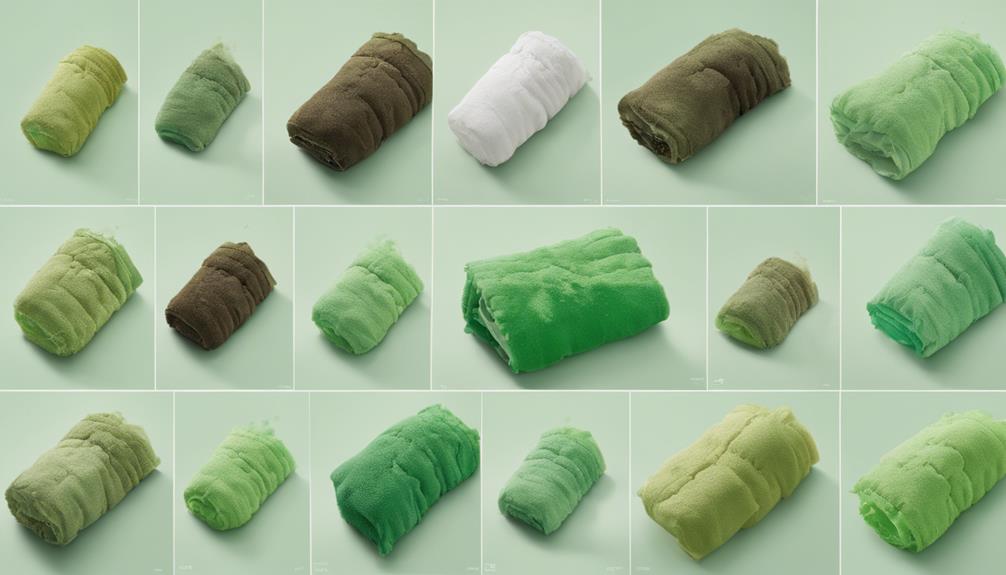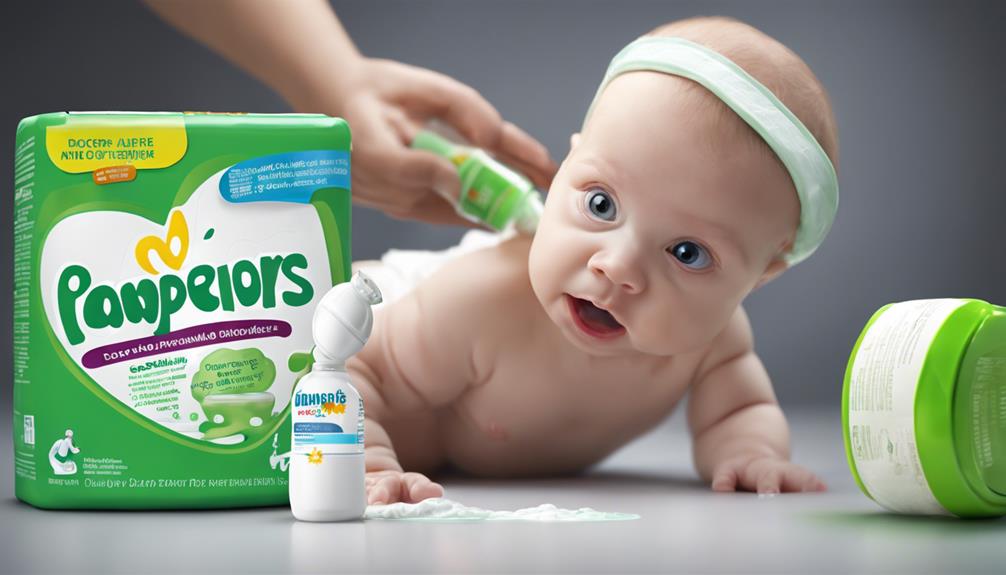As we set out on uncovering the mystery of green poop in newborns, likening it to a compass guiding us through uncharted territory, we aim to shed light on this common yet perplexing occurrence.
Understanding the nuances of your baby's poop color can be as intriguing as it is essential for parental peace of mind.
With insights into the myriad factors influencing the hue of your little one's diapers, we invite you to join us on this journey of knowledge and discovery.
Key Takeaways
- Diet influences newborn stool color, leading to green poop.
- Breastfeeding factors like foremilk-hindmilk imbalance can cause green stools.
- Various causes like illness or maternal diet affect newborn poop color.
- Monitoring, identifying causes, and seeking medical advice are vital for managing green poop in newborns.
Causes of Green Poop in Newborns
Green poop in newborns can be attributed to various factors, including the composition of their diet and digestive processes. When a baby is breastfed, the color of their stool can range from yellow to green. This change in color can occur due to a foremilk-hindmilk imbalance, where the baby may be getting more of the watery foremilk, leading to green, frothy stools. Additionally, if a newborn has an excess of bile in their digestive tract, it can result in their stool appearing greenish.
In some cases, green poop in newborns may also be an indicator of illness or stomach bugs, especially if there's mucus present in the stool. It's essential to monitor the baby for any other symptoms and consult a healthcare provider if there are concerns. Moreover, certain factors like the consumption of green foods by the breastfeeding mother, iron supplements, or food intolerances can also contribute to the baby's stool appearing green. It's important to take into account these various factors when evaluating the color of a newborn's stool.
Differentiating Green Poop in Babies

When differentiating green poop in babies, understanding the various factors influencing stool color is significant for accurate assessment and appropriate actions. Green poop in newborns can be a result of different reasons, ranging from normal variations to potential concerns.
- The change from meconium to regular stool: This is a common cause of green poop in newborns and is usually considered normal.
- Bile or foremilk-hindmilk imbalance: Excess bile or an imbalance in breast milk components can lead to green poop in babies.
- Illness or stomach bugs: In some cases, green poop can be a sign of an underlying illness or infection.
- Food intolerances or maternal diet: Green poop can also be a result of food intolerances in babies or certain foods consumed by breastfeeding mothers.
Green Poop and Breastfeeding
In understanding the connection between breastfeeding and the color of a newborn's stool, it is essential to recognize the impact of the lactating parent's diet on the baby's poop color. The maternal diet plays a significant role in determining the color of breastfed baby poop. For instance, consuming green foods can cause the baby's stool to appear green. Additionally, a foremilk-hindmilk imbalance during breastfeeding can lead to green, frothy stools in infants. It is important to note that the color variations in breastfed baby poop are not exclusive to formula-fed infants and can vary depending on what the lactating parent eats. Green poop in breastfed babies is typically considered a normal variation and is usually not a cause for concern.
| Factors | Effects on Poop Color |
|---|---|
| Lactating Parent's Diet | Green poop in baby |
| Foremilk-hindmilk Imbalance | Green, frothy stools |
| Normal Variation | Varying poop colors |
Managing Green Poop in Infants

To effectively manage green poop in infants, understanding the underlying causes and making necessary adjustments is important for maintaining the baby's digestive health.
Here are some essential tips to help manage green poop in infants:
- Identify the Cause: Determine if the green poop is due to a foremilk-hindmilk imbalance, consumption of green foods by the breastfeeding parent, illness, or other factors.
- Adjust Breastfeeding: If a foremilk-hindmilk imbalance is suspected, make sure the baby empties one breast before switching to the other to make sure they receive the richer hindmilk.
- Monitor Symptoms: Keep an eye on any additional symptoms such as mucus in the stool or signs of discomfort, which may indicate an underlying issue that requires attention.
- Consult a Healthcare Provider: If the green poop persists or is accompanied by other concerning symptoms, seek guidance from a healthcare provider to rule out any serious conditions.
When to Seek Medical Advice
If persistent green poop in a newborn continues for more than 24 hours, consulting a healthcare provider for evaluation is essential. It's important to seek medical advice if green poop is accompanied by signs of dehydration or distress in the baby.
Any unusual behavior or symptoms alongside green poop should prompt a consultation with a doctor. Red flags like severe symptoms or persistent green poop may warrant immediate medical attention.
Monitoring the baby's overall health and well-being when green poop persists is important to guarantee timely intervention if needed. Remember, a healthcare provider can assess the situation, provide necessary guidance, and address any concerns you may have regarding your newborn's green poop.
Don't hesitate to seek professional help if you notice any worrisome symptoms or if the green poop persists despite your interventions. Your baby's well-being is our top priority, and timely medical evaluation can help address any underlying issues effectively.
Frequently Asked Questions
Can Green Poop in Newborns Be a Sign of a Serious Medical Condition?
Yes, green poop in newborns can sometimes indicate a potential issue. While it can be normal due to diet or digestion, if accompanied by other symptoms like fever or fussiness, it's wise to consult a healthcare provider for guidance.
Are There Any Home Remedies That Can Help Alleviate Green Poop in Infants?
When infants have green poop, we often turn to gentle home remedies. Simple changes like adjusting feeding patterns, offering probiotics, or increasing skin-to-skin contact can help ease this common concern in newborns.
Is It Normal for a Breastfed Baby to Have Green Poop Occasionally?
Yes, it is normal for a breastfed baby to have green poop occasionally. Factors like diet changes or foremilk-hindmilk imbalance can cause this. It usually resolves on its own. However, consult a healthcare provider if concerned about frequency or consistency.
Can Introducing Solid Foods Too Early Cause Green Poop in Babies?
Introducing solid foods too early can lead to green poop in babies. This change may indicate their digestive system isn't ready. It's important to follow pediatrician guidelines for introducing solids to prevent issues like this.
How Long Does It Typically Take for Green Poop in Newborns to Resolve on Its Own?
We've noticed that green poop in newborns typically resolves on its own within a few days to a week. If it persists or is accompanied by other concerning symptoms, it's best to consult a healthcare provider for personalized guidance.
Conclusion
After exploring the causes, variations, and management of green poop in newborns, we can confidently say that it's a common and usually harmless occurrence in babies.
By understanding the factors that contribute to green baby poop, parents can feel more at ease and equipped to handle any concerns that may arise.
Remember, monitoring your baby's poop color and consistency is important, but don't hesitate to seek medical advice if you have any doubts or worries.









